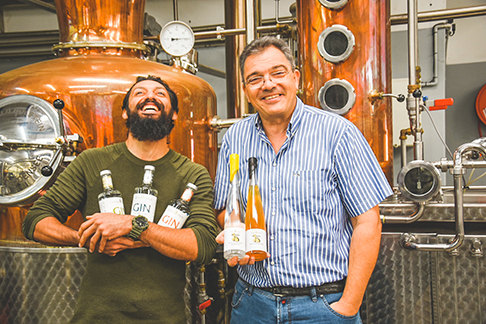You may have heard the phrase “drink responsibly”, but you’ve probably never applied it to your impact on the environment.
Distilleries have the potential to play a significant role in creating a chain of sustainable practices – but they can conversely have a huge impact on the environment if sustainability is not at the heart of their practice.
The production of a 750-millilitre bottle of liquor can be responsible for as much as 2745 grams of carbon dioxide, according to research by the Beverage Industry Environmental Roundtable[1] (BIER). The process creating the most carbon dioxide is distilling, which accounts for more than a third of the footprint.
This is why changing the distillation process to focus on more sustainable practices have huge implications on climate change over the long term, says Triple Three Distillery Master Distiller Rolf Zeitvogel.
Sustainability is at the heart of the Triple Three Distillery. The brand is built on three generations of heritage and knowledge, with each drop of premium gin part of building a legacy.
It’s this future thinking, built on the shoulders of passed-down knowledge, that has seen the distillery implementing sustainable practices through the distilling process.
Changing the impact of distilling starts with ingredients, explains Rolf. Choosing locally produced, high-quality products will not only ensure a refined taste but will also streamline supply chain processes.
 This has become a key focus for the gin industry, as the world faces a global juniper berry shortage. Juniper berries are the essential ingredient in gin, and a shortage could force distillers to turn to synthetic alternatives, explains Rolf.
This has become a key focus for the gin industry, as the world faces a global juniper berry shortage. Juniper berries are the essential ingredient in gin, and a shortage could force distillers to turn to synthetic alternatives, explains Rolf.
“A shortage of juniper can lead to the need for artificial flavourings needed to replace the natural ingredients,” he says.
The shortage has highlighted the interplay of nature and commerce – research[2] has found that global warming could have an effect on juniper crops, and many producers have in recent years struggled to keep crops free of pathogens.
Some of the products locally sourced, from ethical farmers, include rooibos and buchu – sourced from accredited fynbos farmers in the Western Cape, as well as farm fresh and untreated citrus from the Western Cape and Eastern Cape.
“Ensuring that as many goods are sourced locally will ensure a less complicated supply chain, therefore an eco-friendly system and an increase in local, small business employment. Not only using, but knowing your suppliers ensures that you use products that are sourced at best practice and of great quality.
“Ethically sourced ingredients do not necessarily ensure a better product. You will need to ensure your partners are both ethical and that their product is of great quality,” Rolf added.
Triple Three Distillery purchases fruit and local ingredients directly from the farm and ripens these fruits in house. These are then fermented on-site, before being distilled in three heritage copper potstills.
“This ensures that our supply chain is tight as well as far less wastage and full control of our entire process from farm to bottle,” says Rolf.
Creating the perfect gin goes beyond a passion for distilling – it requires a dedication to every step of the production process. This is why Triple Three Distillery uses as many green practices as possible, including drawing power from a solar panel on its roof, making use of bottles made from recycled glass, and reducing waste in the distilling process.
“An area that is often neglected when it comes to sustainability in distillation is the production from fermentation to bottling. There are large amounts of waste that can be generated when moving the ingredients between fermentation and distillation, and later bottling. Keeping this all-in house under the same roof reduces transportation, warehousing and packaging materials,” Rolf says.
In addition, careful planning of ingredients can help reduce unnecessary demand on produce already facing a shortage, such as juniper berries, Rolf says.
“A skilled distiller can accurately gauge the amount of botanical ingredients needed without unnecessary wastage. Craft distillers will need to focus on learning the entire process of distillation, from farm to bottle as this is the only way to truly understand, control and practise sustainability at its best,” he concludes.
Sustainable practices in the distilling process not only make good business sense, but they also result in a better product and give consumers the option to make more sustainable purchasing choices – which will no doubt seen more distilleries beginning to implement these changes.


